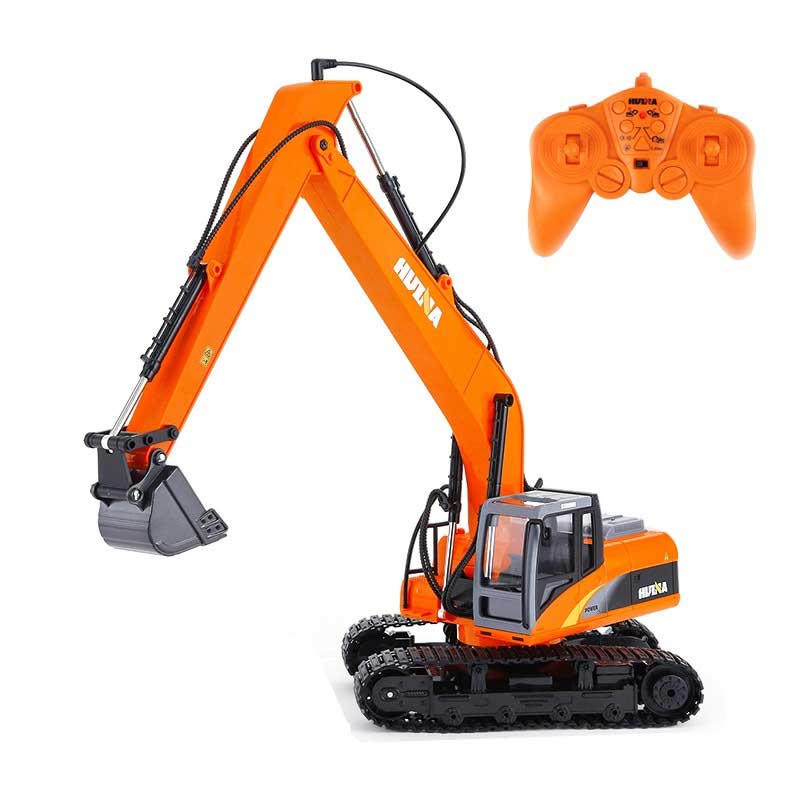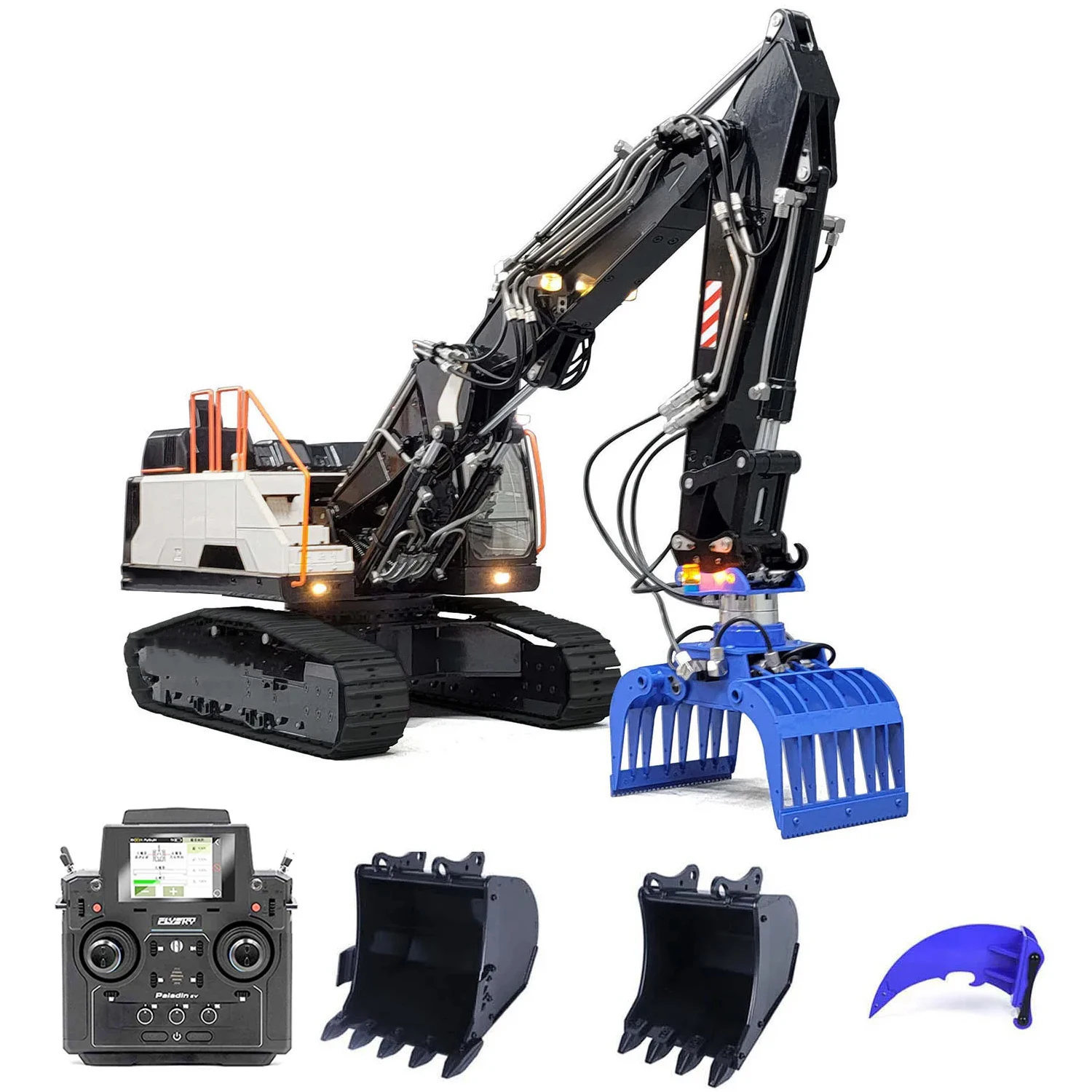10 Common Mistakes to Avoid When Operating a rc excavator
Discover the Value of Excavator in Modern Building And Construction Projects
Excavators are important tools in contemporary building tasks. Their versatility permits them to perform a vast array of jobs, from digging and grading to demolition and site preparation. Advanced features, such as hydraulic accessories and GPS, improve their abilities and performance on task sites. As the market progresses, the value of excavators grows also more. Recognizing their role can reveal understandings right into the future of building techniques. What lies in advance for these makers?
The Versatility of Excavators in Various Projects
Excavators are frequently connected with massive construction projects, their versatility enables them to be utilized in a large array of applications, from residential landscape design to energy upkeep. In city settings, excavators can navigate tight rooms to dig foundations for homes or set up drain systems. Their capability to perform delicate tasks makes them suitable for landscape design tasks, where they can excavate for ponds or plant trees. On top of that, excavators play an important duty in utility upkeep, successfully excavating trenches for pipes or cords without interrupting bordering areas. In agricultural applications, they help in land cleaning and soil prep work. In addition, their adaptability allows them to be equipped with various attachments, improving their performance across various tasks. This complex nature of excavators not just enhances various construction procedures but additionally demonstrates their integral duty in modern facilities advancement and upkeep.
Secret Features and Kinds of Excavators
The discussion on vital attributes and types of excavators highlights the essential attributes that make these makers vital in building and construction. Various excavator types, each created for certain tasks, show their adaptability and efficiency throughout different applications. rc excavator. Understanding these categories and functions is crucial for enhancing their use in modern building jobs
Excavator Keys In Review
Excavators play an essential role in contemporary building and construction, offering adaptability and efficiency throughout different jobs. These hefty equipment units come in several types, each customized for certain applications. The most typical types include crawler excavators, recognized for their stability on uneven terrain, and rolled excavators, which provide higher flexibility on smooth surface areas. Tiny excavators are favored for small-scale projects and tight rooms, while long-reach excavators are developed for deep digging. Furthermore, there are specialized excavators, such as hydraulic excavators, which enhance power and accuracy. Each kind features special capacities, making them essential for tasks ranging from digging and grading to demolition and material handling. Understanding these variants enables building and construction experts to pick the right excavator for their job needs.
Secret Features Explained
Recognizing the essential features of excavators enhances their effective application in building tasks. Excavators are characterized by their powerful hydraulic systems, which give the necessary pressure for digging, lifting, and moving products. Their expressed arms permit for a vast array of movement, assisting in precise procedures in confined rooms. Furthermore, the selection of accessories, such as buckets, grapples, and augers, increases their versatility to satisfy different job requirements. The dimension and weight of excavators likewise contribute to their security and maneuverability on various surfaces. In addition, innovations in innovation have actually resulted in the assimilation of general practitioner and automation, improving accuracy and efficiency in excavation jobs. These features collectively place excavators as crucial tools in modern construction.
Applications in Building
Transforming construction sites, excavators play an essential role across various applications, varying from domestic structure jobs to massive infrastructure growths. These functional makers are outfitted for jobs such as excavating foundations, trenching for utilities, and site grading. Various types of excavators, consisting of crawler, rolled, and mini excavators, provide specific benefits tailored to the project needs. Crawler excavators succeed in harsh terrains, while rolled excavators offer mobility on smooth surfaces. Small excavators are suitable for constrained spaces, making them prominent in urban setups. The performance and power of excavators substantially speed up construction processes, making certain prompt task conclusion. Their adaptability better boosts their value, permitting building groups to deal with a varied array of obstacles effectively.
Enhancing Efficiency and Productivity on Task Sites
Taking full advantage of efficiency and performance on task websites is an important objective in contemporary construction. Excavators play an essential function in achieving this objective by improving various tasks. Their ability to execute several functions-- such as lifting, grading, and digging-- decreases the demand for additional equipment, therefore saving time and resources.Moreover, excavators improve operations by enabling faster conclusion of tasks. With advanced functions like hydraulic accessories and GPS modern technology, they can carry out precise operations that decrease mistakes and remodel. This accuracy not only improves the high quality of job but likewise maximizes product use, adding to set you back savings.The flexibility of excavators allows them to adapt to different website conditions, ensuring that jobs advance efficiently regardless of challenges. By incorporating excavators into building processes, teams can considerably enhance their overall performance, leading to timely job completion and enhanced earnings.
Safety Advantages of Using Excavators
Excavators substantially improve safety and security on building and construction websites with enhanced operator presence and reduced manual work risks. By supplying operators with a clear view of their environments, excavators aid to protect against injuries and crashes. Additionally, the machinery reduces the need for employees to take part in harmful hand-operated tasks, even more advertising a much safer job atmosphere.
Improved Operator Exposure
Building and construction websites can be chaotic and filled up with potential risks, improved driver visibility plays a necessary duty in making certain safety and security when utilizing excavators. Modern excavators are made with large, unobstructed home windows and purposefully positioned mirrors, allowing operators to keep a clear sight of their surroundings (rc excavator). This boosted presence is crucial for finding click here now pedestrians, various other machinery, and go to the website various obstacles, considerably minimizing the threat of accidents. In addition, lots of excavators include innovative modern technology, such as electronic cameras and sensing units, to provide operators with additional perspectives, additionally improving recognition. The capability to see even more clearly not just help in efficient operation however likewise cultivates a much safer job environment, making it less complicated for operators to navigate complicated building sites without endangering safety criteria
Minimized Manual Labor Threats
When hands-on labor is lowered via making use of excavators, numerous safety and security benefits arise, markedly enhancing the health of construction workers. Excavators reduce the physical stress related to heavy lifting and repeated tasks, efficiently lowering the risk of bone and joint injuries. By automating processes such as digging, grading, and moving products, they allow employees to maintain a more secure distance from potential hazards. Furthermore, excavators are furnished with sophisticated safety attributes, such as rollover protection systems and enhanced operator ergonomics, which better guard employees on website. The outcome is a significant decrease in workplace accidents and injuries, leading to boosted efficiency and morale amongst building teams. Eventually, the adoption of excavators adds to a more secure and more effective building atmosphere.
Excavators in Earthmoving and Website Preparation
In contemporary building and construction, a considerable section of earthmoving and site prep work tasks depends on the efficiency and flexibility of excavators. These machines are created to manage different dirt kinds and surface, making them important for rating, excavating, and trenching activities. Their hydraulic arms can be furnished with different add-ons, such as augers and pails, enabling drivers to customize their method based upon particular job requirements.Excavators stand out at relocating large quantities of earth useful content rapidly and efficiently, which accelerates the total construction timeline. They can navigate tight spaces and challenging websites where traditional tools might struggle, enhancing productivity. In addition, the accuracy of excavators guarantees that site preparation complies with stringent specs, decreasing the danger of errors that could lead to expensive rework.
The Role of Excavators in Demolition Tasks
Excavators play a necessary function in demolition jobs, as they have the power and agility required to dismantle frameworks effectively. Outfitted with various accessories such as hydraulic breakers, shears, and grapples, these devices can adjust to various demolition requirements, whether for small structures or huge industrial websites. Their flexibility makes it possible for operators to deal with complicated projects while preserving safety and precision.In addition to their demolition capabilities, excavators assist in particles removal, making sure that job websites remain orderly and safe. By damaging down structures into convenient items, they enable for streamlined cleaning and recycling of materials, lining up with contemporary sustainability efforts.Moreover, excavators can access tight areas and browse irregular terrain, making them indispensable in metropolitan demolition jobs. Overall, their robust style and multifunctionality make excavators a crucial property in the demolition stage of construction, adding significantly to task timelines and performance.


Future Fads in Excavator Innovation and Usage
As the building and construction market advances, developments in excavator technology are positioned to transform their use and effectiveness markedly. One considerable trend is the assimilation of automation and artificial intelligence, enabling excavators to run with marginal human intervention. This shift will certainly boost accuracy in jobs such as grading and trenching, reducing human error and increasing productivity.Additionally, the rise of electric and hybrid excavators is shaping an extra sustainable construction setting, decreasing carbon exhausts and gas prices. Improved telematics systems are also arising, enabling real-time surveillance of maker performance and upkeep needs, which can bring about much better functional performance and longer equipment lifespan.Moreover, improvements in accessory innovation are increasing the convenience of excavators, permitting them to perform a more comprehensive variety of tasks. The mix of these trends demonstrates a future where excavators are smarter, greener, and more versatile, inevitably improving construction task dynamics.
Regularly Asked Inquiries
How Do Excavators Compare to Other Building And Construction Machinery?
Excavators, identified by their flexibility and power, master excavating and earthmoving contrasted to other equipment. Their capability to carry out various tasks, consisting of lifting and demolition, makes them vital in building and construction tasks, boosting total effectiveness.

What Is the Typical Life Expectancy of an Excavator?
The average life expectancy of an excavator typically ranges from 7,000 to 10,000 operating hours, relying on maintenance, usage problems, and version. Correct care can prolong this life expectancy, guaranteeing peak performance throughout its operational years.
Exactly How Are Excavators Preserved for Optimal Performance?
Excavators require normal upkeep for peak efficiency, including regular examinations, fluid checks, filter substitutes, and prompt repair services. Implementing a preventive maintenance schedule aids extend their lifespan and guarantees efficient operation in different building and construction settings.
What Are the Prices Associated With Buying an excavator vs. leasing?
The costs related to renting out versus getting an excavator differ significantly. Leasing deals lower upfront expenditures but can gather with time, while purchasing calls for a significant first financial investment, but offers lasting cost savings and possession ownership advantages.
What Training Is Called For to Run an Excavator?
Operating an excavator requires specialized training, normally consisting of safety and security protocols, device operation strategies, and environmental awareness. Accreditation programs usually mandate functional experience, enabling drivers to handle various tasks efficiently while making certain conformity with market guidelines. The most common kinds include crawler excavators, understood for their stability on irregular surface, and rolled excavators, which supply greater movement on paved surface areas. Small excavators are preferred for small projects and tight spaces, while long-reach excavators are developed for deep excavating. Furthermore, there are specific excavators, such as hydraulic excavators, which boost power and precision. Various types of excavators, including spider, wheeled, and mini excavators, give certain advantages customized to the job demands. Spider excavators excel in rough terrains, while rolled excavators supply mobility on paved surfaces.